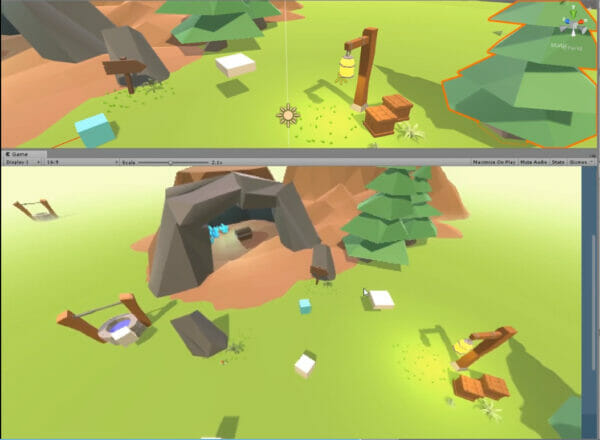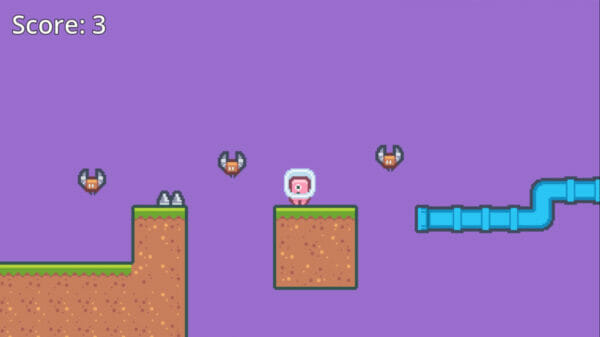Game development is super fun, but also super complex – which is why game development courses can be a big help.
First you have to learn a game engine, then coding, and then a slew of other concepts just to build something that can handle basic input and output. It’s no wonder people often don’t know where to get started! Thankfully, though, online educational resources are available to help you on that journey – so you aren’t in it alone.
In this article, we’ll help you discover what we believe to be some of the best game development courses available – such as Zenva’s amazing Mini-Degrees which offer comprehensive curriculums on the hottest topics – so you can start your learning journey. We’ll try to spread things here out between a few different engines and tools, so don’t worry about being pigeonholed in one direction.
Without delay, let’s get started!
Table of contents
What is game development?
Before we go too far down the rabbit hole, we did want to take a moment to define game development. In this way, we can approach this list all from the same place and footing (and we aren’t stuck making too many assumptions about your own knowledge either).
In simple terms, game development is the process of developing a video game. A developer transforms games from concept to reality by coding visual elements and features, and testing the game until it’s ready to go to market. To be a successful game developer, individuals need to be patient, able to overcome problems, and have analytical thinking skills.
Because of the complex nature of game development, professionals are paid well – with the average developer earning $101,160 a year in the US. They code games in a variety of formats including PC and Mac, consoles, web browsers, and mobile games.
By learning game development skills you’ll not only be able to enter a rewarding, creative, and in-demand career, but you’ll also gain transferable skills that can be applied to other aspects of your work life, including problem-solving, design, and self-learning.
Learning coding also gives you many transferable skills and benefits, including skills in design, teamwork, and project management.
Even better, coding and game development skills can be learned from the comfort of your home. There are hundreds of professional game development courses online available to anyone with the desire and determination to learn coding skills. There’s no need to go to university – with online game development courses, like those provided by platforms like Zenva, you’ll be able to learn professional skills at your own pace and in your own time.
What are the best online game development courses?
As stated, if you’re interested in learning with game development courses online, then you’re in luck. There are thousands of game development courses available, each catering to people of a different age and skill level. If you’re unsure of which course is right for you then don’t worry – we’ve narrowed down what we think are the most comprehensive to start with. We encourage you to explore all of them – as what your game engine preference is might not be immediately obvious.

Unity Game Development Mini-Degree
Unity is one of the most popular game engines to date, powering 50 percent of all games in the world and used in over 190 countries. Luckily, it’s also one of the easier ways to learn the art of game development and design, while also being able to handle complicated 2D and 3D projects as well as mixed approaches. Both beginners and experienced developers are more than capable of harnessing the power of Unity to make games in a variety of different formats.
Zenva’s Unity Game Development Mini-Degree is a full curriculum designed for beginners or intermediate developers to master Unity from the ground up. Featuring real-world projects, several different game development courses, and tons of different Unity tools, learners can master everything from the fundamentals to building their own professional development portfolio.
We especially want to emphasize the project-based approach for this curriculum, as learners get the opportunity to build real-world projects such as FPS games, idle clicks, racing games, procedurally generated maps, 3D assets, animations, and more!
Overall, this curriculum gives learners all they will need to thrive in the video game industry.
Key topics covered:
- Coding basics
- UI systems
- Audio effects
- Cinematic cutscenes
- Special effects
- Procedural terrain
- Animation
Skill level: Beginner. This is a comprehensive course with over 20 modules. You’ll learn everything you need about Unity to be able to code your own games in the future.
Duration: 36h 23m
How to access: Access the curriculum here.

Unreal Game Development Mini-Degree
Unreal Engine is a real-time 3D creation platform for creating games with hyperrealistic visuals and animations. It’s used by indies and AAA studios for a variety of games, being just an all-around powerhouse. Using its unique Blueprints Visual Scripting system, Unreal also allows novice developers to build games, even if they’ve never coded before. It’s also royalty-free until you earn over a million dollars, so it’s safe for hobbyists on a budget as well.
Because Unreal Engine is royalty-free and only charges once a game earns over a million dollars, it’s one of the most popular engines for beginners operating in the game development industry.
Zenva’s Unreal Game Development Mini-Degree is a curriculum of game development courses centered around getting industry ready. Learners get to start with the simple basics of using Unreal Engine – and the tools it has to offer – and then go straight to practical application.
With the idea you’ll use the curriculum to build a portfolio, you’ll get to explore projects in a variety of popular genres. This includes things like FPS games, action RPGs, arcade-style games, walking simulators, and even strategy games.
This set is just amazingly comprehensive for getting started with the engine and learning tons of useful ways to build real-world games with Unreal!
Key topics covered:
- Unreal Engine’s various features
- Using the Blueprints Visual Scripting system
- Animation controls with state machines
- Materials and lighting
- Controlling gameplay flow
- Various game genre mechanics
Skill level: Beginner. This is a comprehensive course with 10 modules. You’ll learn everything you need about the Unreal Engine to be able to start your career in the video game industry.
Duration: 16h 52m
How to access: Access the curriculum here.

Godot 4 Game Development Mini-Degree
Godot is a cross-platform and open-source game engine designed making both 2D and 3D games. While it hasn’t been yet adopted in significant regard by AAA studios, it’s found a popular niche with indie developers. It features unique, flexible node-based systems that speed up the game creation process and uses GDScript, an easy-to-learn scripting language made specifically to make the most out of the Godot engine.
With Zenva’ Godot 4 Game Development Mini-Degree, you’ll get to jump in as a complete novice and end up with a few nifty projects for your portfolio. Along the way, you’ll of course learn a ton of important fundamentals that can be utilized in future projects, including some of the most popular game mechanics available!
Among the projects included in the game development courses, you’ll master making both 2D and 3D platformers, RTS games, turn-based battle systems for RPGs, and even the foundations for a survival game!
No matter your skill level, this curriculum will ensure you’re ready to make whatever you could want with Godot – and perhaps even make a career out of it!
Key topics covered:
- Using 2D and 3D assets
- GDScript – the language powering Godot
- Gameplay flow
- Player & enemy combat
- Item collection & UI systems
- Survival, RPG, strategy, & platformer mechanics
Skill level: Beginner. This course is suitable for learners with no prior coding experience.
Duration: 10h 59m
How to access: Access the curriculum here.
Learn Python by Building Five Games – Full Course
Python is one of the easiest programming languages to learn, and is used by developers and non-developers alike. It is used to develop hundreds of professional games, including the popular Disney’s ToonTown. While it is less widely used in gaming compared to the previously mentioned engines, it is fantastic for novice developers.
The Learn Python by Building Five Games YouTube course is provided by freeCodeCamp.org. Individuals can use this free course to learn Python at a beginner level by taking on five projects: Pong, Snake, Connect Four, Tetris, and an Online Multiplayer game.
If you learn best through practical learning, we would recommend this course.
However – be warned. FreeCodeCamp game development courses are designed for independent learning, and you’ll have no access to professional mentors (unlike premium services like Zenva). If you work better with structured learning and regular goals and trophies, this YouTube tutorial might not be for you.
Key topics covered:
- Learn how to build a Pong game
- Learn how to build a Snake game
- Learn how to build a Connect Four game
- Learn how to build a Tetris game
- Learn how to build an Online Multiplayer game
Skill level: Intermediate. Since this is a practical course, you’ll need some basic knowledge of Python.
Duration: 6h 43m
How to access: Access the course here.

Unit: Advanced JS: Natural Simulations
Khan Academy is a free, nonprofit platform offering comprehensive courses to students, all from the comfort of their homes. While other platforms specialize in coding, Khan Academy has a range of courses from math to economics. While this means there are slim pickings compared to platforms like Zenva, that doesn’t mean it has nothing to offer.
The Advanced JS Natural Simulations course hosted by Khan Academy teaches students how to combine JS, ProcessingJS, and math concepts in order to simulate nature in your games and programs. This course teaches students using the “Nature of Code ” book by Daniel Shiffman from natureofcode.com.
Students taking this course will learn everything from adding randomness to your game to vectors and forces. There’s not much practical learning on this course – instead it focuses on intricate game concepts and theory. Because of this, this course is better suited to older children or adults.
The Advanced JS course is designed for those that have prior knowledge of coding and game development. Similar to the entry above, there’s no mentoring available to students of Khan Academy, so if you’re unsure whether you have the knowledge base to complete the course, it may be best to look elsewhere. Other platforms like Zenva can offer far more beginner-friendly experiences (as well as help through course mentors).
Key topics covered:
- Intro to Natural Simulations
- Randomness
- Noise
- Vectors
- Forces
- Angular Movement
- Oscillations
- Particle Systems
Skill level: Advanced. This course is designed to be taken after the Intro to JS course, also hosted by Khan Academy.
Duration: Taken at your own pace.
How to access: Access the course here.
JavaScript Tutorial – Create a Card Game
While engines offer powerful, cross-platform abilities, sometimes it’s good to know just how to bring games to the web. After all, there’s something to be said for old classics where people made mini-games right on their own webpages. JavaScript is the main driving force for this sort of activity, and given its one of the core pillars of web development, it never hurts to learn JavaScript.
In JavaScript Tutorial – Create a Card Game, brought to you again by freeCodeCamp.org, you’ll learn to make a web-oriented game from scratch using just HTML, CSS, and JavaScript. You’ll explore important concepts such as dynamic data updates, animation effects, and so forth. You’ll also, of course, learn how to tap into the webpage aesthetics as well so your card game looks the best it can.
Summarized, this doesn’t sound like a lot – but trust us, there’s a lot that goes into this! Plus, regardless of your next steps after this, we’re sure your JavaScript skills will be improved so you can explore other frameworks, such as Phaser which is JavaScript-based.
Key topics covered:
- Live Server Extension
- Create Cards – HTML
- Create the Game Play Grid
- Create Cards Dynamically – JS Code
- Initialise Card Positions
- Load Game and Start Game
- Stack Cards
- Flip Cards
- Shuffle Cards
- Deal Cards
- Choose Card
- Styling and Layout
- Animation
- Responsive Layout
- Local Storage
Skill level: Beginner. No prior knowledge needed.
Duration: 1h 31m
How to access: Access the course here.
Best Game Development Courses Wrap Up
And there you have it – some of the best game development courses you can learn from. We had to keep this list super short, so don’t think that’s all there is out there. There are simply too many resources to name. Plus, the best resource often comes down to personal preferences such as 1) how much time you want to invest, 2) how much budget you have, and 3) your personal learning needs.
This said, we really encourage you to try out all the resources. Picking a good game engine for your projects can often mean just experimenting with everything the world has to offer. By trying things out, though, you can get a definitive feel for what you like and don’t like.
Ultimately, whether you go with a paid and full-supportive service or something free, we’re confident anybody can learn game development given the time. However, paid services do have their advantages. For example, Zenva’s ample collection of game development Mini-Degrees come not just with video lessons, but with quizzes, challenges, text summaries, and full source code. Plus, you can get the chance to explore popular engines like Godot, Unreal, and Unity with professional industry instructors.
Good luck, and we look forward to your journey ahead!
Did you come across any errors in this tutorial? Please let us know by completing this form and we’ll look into it!

FINAL DAYS: Unlock coding courses in Unity, Godot, Unreal, Python and more.







